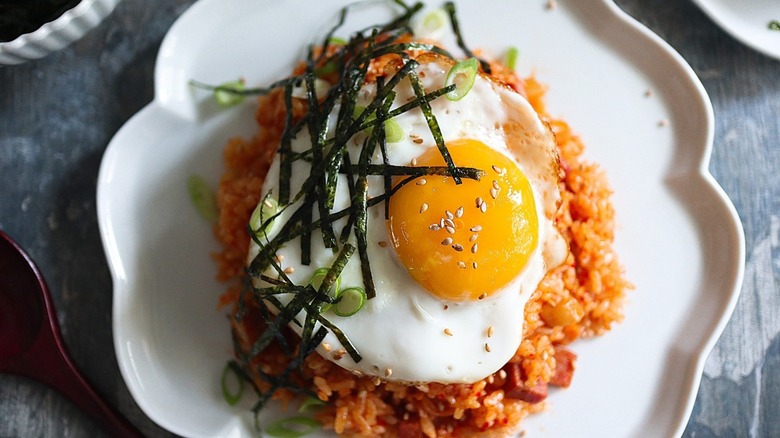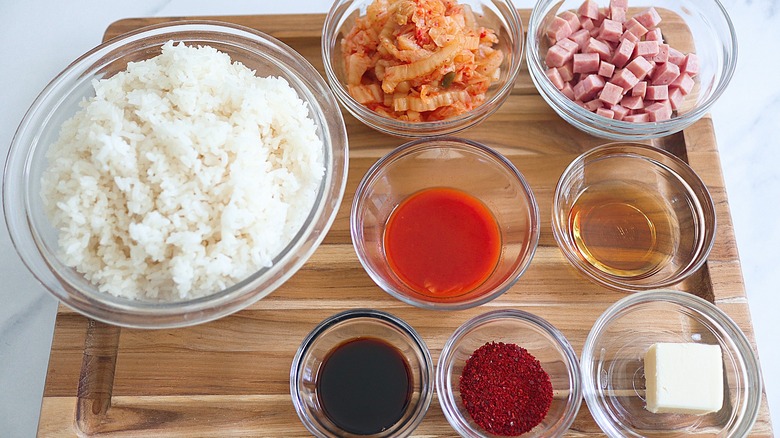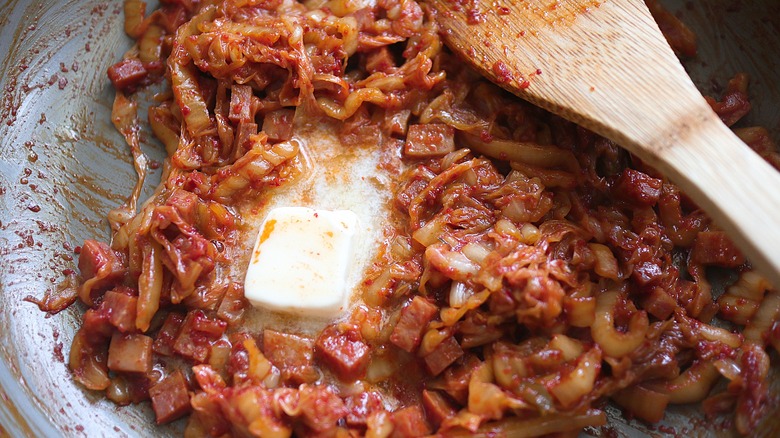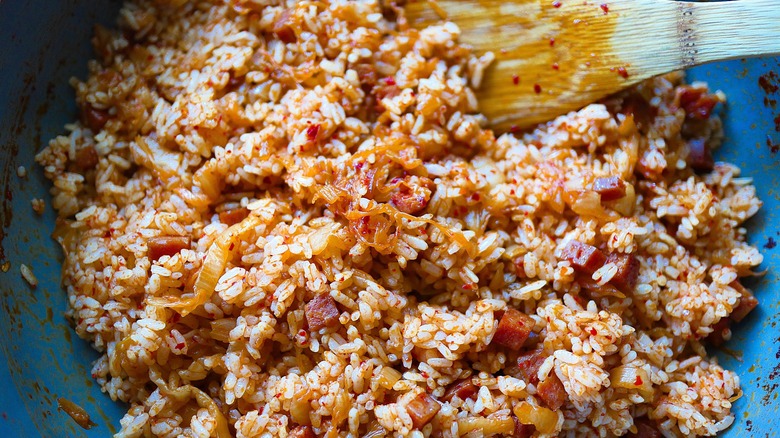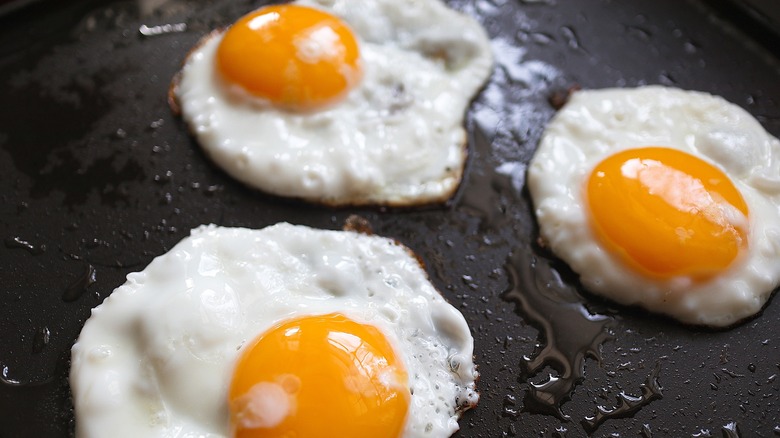Kimchi Fried Rice With Spam Recipe
A simple fried rice dish is one of those foods everyone needs to have in their repertoire, but it's even tastier (and healthier!) if you make it with kimchi. As recipe developer Cecilia Ryu points out, "This is definitely a one-pot dish!" That's true except, of course, if you choose to top it with a fried egg, and she says you absolutely should. "It can be eaten without the fried egg," she says but adds, "the runny yolk adds so much flavor and also balances out some of the heat." She says that whenever she's ordered kimchi fried rice in a restaurant, this dish has come topped with a fried egg. "Needless to say," she tells us, "it's an essential part [of] kimchi fried rice in my opinion. "
So what about the Spam? If you're still a Spam skeptic, you may be dubious about this mystery meat, but it's definitely worth a try. Ryu says, "I love Spam! It's very popular in Korean cooking. We use it in stews, rice, and even in side dishes." She does say you could skip the Spam, or you could use bacon or leftover ham instead, but we still think you should go with the Spam chunks. So, let's get started!
Acquire the necessary ingredients for this fried rice
None of the ingredients you need for this dish should be too difficult to source. In most cases, you should be able to get everything you need at your local grocery store. If your neighborhood supermarket isn't super well-stocked, it's possibly you may need to venture out to an Asian market for the kimchi and the gochugaru, but these days, both ingredients are so popular that most markets will carry them. If your store does offer an extensive selection of kimchi, however, Ryu offers the following tip: "The kimchi used in this dish is napa cabbage kimchi. It is most commonly used when making kimchi fried rice."
In addition to the aforementioned Korean ingredients, you'll need canola oil and butter for cooking, soy sauce and sesame oil for flavoring, and Spam and eggs to give the dish some protein. Oh, and rice, of course, make sure you have plain cooked white rice. If you like, you can garnish the dish with sliced scallions, shredded nori (roasted seaweed), and/or toasted sesame seeds.
Sauté the Spam and seasonings
Begin this fried rice dish by heating two tablespoons of the canola oil in a skillet over medium-high heat. Add the diced Spam to the pan and sauté the meat for about five minutes until it is just beginning to brown. At this point, add the kimchi and the kimchi juice to the pan along with the soy sauce and the gochugaru. Sauté the whole thing for five to 10 more minutes, then add the butter into the mix and stir until it's melted.
You may need to adjust the amounts of rice and spice
Once the butter melts, stir three and a half cups of cooked rice into the kimchi mixture, and keep stirring until all of the rice is coated with the sauce. At this point, take a little taste to check the seasonings. Ryu tells us that "Kimchi varies tremendously depending on the brand or whoever is making it if it is homemade. Even though the ingredients used to make kimchi seem similar, the flavor [and] saltiness are very different." If your fried rice is too salty with three and a half cups of rice, you may need to add another half cup of cooked rice to the mix to tone the salt down.
Ryu also says that adding more kimchi juice may be necessary to perk up the flavor, and you may also need to either reduce or increase the amount of gochugaru depending on how spicy your kimchi is. "Tasting as you go along," she tells us, "is essential to this recipe." Once you've adjusted the seasonings to suit your preference, stir in the sesame oil. Now turn off the heat and set the rice aside for a few moments.
Finish this fried rice off with a few fried eggs
Using another nonstick skillet, heat up the remaining tablespoon of canola oil. Crack the eggs into the pan and fry them until they're done — Ryu recommends cooking the eggs sunny-side up. Once the eggs are done, divide the fried rice into three dishes. Top each serving with a fried egg, then serve the fried rice right away before the eggs and rice get cold. If you wish, you can also use scallions, nori, and sesame seeds to garnish your creation, and you can always sprinkle on some extra gochugaru if you're a real hothead.
Ryu tells us that since this fried rice "is truly a one-pot meal," it doesn't need any side dishes. She does allow, though, that if you really want a first course, you could always go with a very mild, broth-based soup, which she says can "balance out the bold flavors of the kimchi."
Kimchi Fried Rice With Spam Recipe
A simple fried rice dish is one of those foods everyone needs to have in their repertoire, but it's even tastier (and healthier!) if you make it with kimchi.
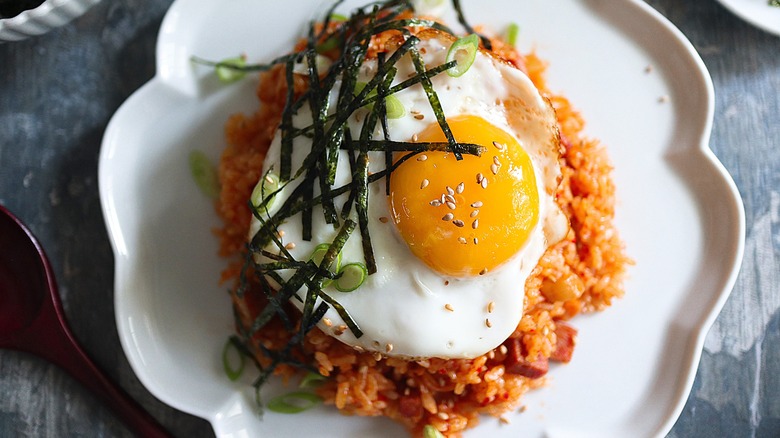
Ingredients
- 3 tablespoons canola oil, divided
- ¾ cup diced Spam
- 1 cup chopped kimchi
- 2 tablespoons kimchi juice
- 1 tablespoon soy sauce
- 1 tablespoon gochugaru (Korean red pepper flakes)
- 2 tablespoons unsalted butter
- 3 ½ cups cooked white rice
- 1 tablespoon sesame oil
- 3 eggs
Optional Ingredients
- Chopped scallions
- Finely shredded nori (roasted seaweed)
- Toasted sesame seeds
Directions
- Heat 2 tablespoons of canola oil over medium-high heat in a nonstick pan or cast-iron skillet.
- Add Spam to skillet and sauté until slightly browned, about 5 minutes.
- Add chopped kimchi, kimchi juice, soy sauce, and gochugaru, and sauté for 5 to 10 minutes.
- Add butter to the pan and mix until melted.
- Add 3 ½ cups of cooked rice to the pan and mix until all of the rice is covered in the kimchi and sauce.
- Taste the fried rice for seasoning and adjust as necessary, adding extra rice if needed to decrease the saltiness.
- Add the sesame oil to the fried rice and mix well.
- Turn off heat and set the rice aside.
- In a separate nonstick skillet, heat 1 tablespoon canola oil over medium-high heat.
- Fry eggs to your desired doneness, preferably sunny side up.
- Serve the kimchi fried rice topped with a fried egg and garnish, if desired, with chopped scallions, shredded nori, and sesame seeds.
Nutrition
| Calories per Serving | 597 |
| Total Fat | 30.9 g |
| Saturated Fat | 8.0 g |
| Trans Fat | 0.4 g |
| Cholesterol | 180.3 mg |
| Total Carbohydrates | 66.3 g |
| Dietary Fiber | 2.7 g |
| Total Sugars | 1.2 g |
| Sodium | 511.6 mg |
| Protein | 12.1 g |
